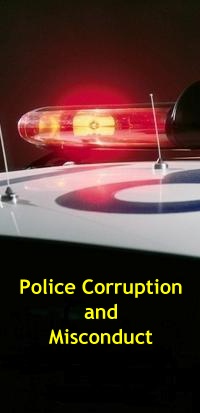|
Find a Criminal Justice Degree
This course
explores police misconduct and corruption from both a historical and contemporary view.
The course looks at aspect of the police subculture and different police organizational structures which may encourage
or enable misconduct. Students will examine potential causes of misconduct and
corruption, and conduct an assessment of the various proposals for reform. The
course will specifically look at how hiring and training, police bureaucracy, police socialization, law, policy, community
input, political pressure and pressure from special interest groups may influence police misconduct.
-
be able to compare and contrast the different aspect to police misconduct.
-
be able to explain the various theories on police misconduct.
-
explore the police subculture as a potential source of misconduct.
-
explore the organizational and bureaucratic aspects of police agencies which may
enable misconduct.
-
understand the different types of internal investigations conducted by police agencies.
-
understand the restrictions on a police officer’s Constitutional Rights.
-
be able to explain various attempts at police reform.
-
have increased their analytical, research, writing, information
literacy and communication skills.
Download the Syllabus
Although not used for
this course, the book description of Brotherhood of Corruption: A Cop Breaks the Silence on Police Abuse, Brutality,
and Racial Profiling says, “Juarez, a Chicago cop for seven years, offers a harrowing inside look at the
corrupt practices used by police in enforcing drug laws and the blue wall of silence that insulates them. No angel as a youth,
Juarez jumped at the chance to become a cop, like his father, and the opportunity for stability, job security, and maybe a
chance to correct some social ills. As a member of an elite narcotics unit, what he found instead were glaring inequities--repeated
busts of street-corner dealers but a blind eye toward the dealing and use of drugs in more rarefied circles. He witnessed
police abuse of power, beatings of suspects, sexual abuse of female suspects, and repeated use of racial profiling in arrests
and prosecutions in the war on drugs. He succumbed to temptation and joined his colleagues in abuse and corruption. Disillusionment
and his own personal demons eventually led to his downfall. This is a starkly revealing look at how urban policing oversteps
the bounds of the law in the so-called war on drugs.”
Although not used in this course, the book description of
Police Misconduct: A Reader for the 21st Century says, “In an era when police administrators
are advocating closer ties with citizens in their communities, scandals such as corruption, brutality, illicit drug use, as
well as other criminal activities committed by police officers do little to portray the positive image the agencies are striving
to attain. For the past several decades, police misconduct has made news headlines all too frequently. The tragedy of these
primetime police scandals is that they give a black eye to the police officer who has integrity and who refrains from committing
even a minor act that could be construed as misconduct. A greater tragedy occurs when citizens of the community and the nation
lose their confidence in the police. The reputation of a police agency transcends its immediate community and more often than
not, affects surrounding communities and police departments. Not only does misconduct committed by an officer personally affect
that officer, it also affects the community, the police department that employs the officer and every police department and
police officer in America. Frequently, negative police actions caused by inappropriate police behavior reaches every corner
of the nation, and at times, the world. Police misconduct cannot be tolerated. Due to the nature of police work, law enforcement
officers need to be held to higher standards than the average citizen. A tarnished image of policing cuts deep into the moral
fabric of our nation's character. Throughout the world, people watch police officers to determine whether they are living
up to the standards expected of those in a position of law enforcement and public trust. Police officers are expected to be
protectors, not abusers of society. The primary responsibility of police in our society is to protect the human rights of
all citizens regardless of socioeconomic status, ethnic make-up, race, gender, or religious beliefs. When police officers
abuse those same citizens they have sworn to protect, they are ethically and morally violating the oath they committed to
the first day they joined the police force. The collection of articles contained within this book has been divided into four
sections. The first section, "Introduction to Police Misconduct," discusses legal issues pertaining to police authority
and defines police misconduct. The second section, "Crimes Committed by Police Officers," discusses police corruption
and reviews specific crimes that have been committed by law enforcement officers. The third section, "Physical Abuse
by Police Officers," discusses police brutality, deadly force, and high-speed pursuits. The final section of the book,
"Police Accountability," discusses the various techniques and strategies to control police misconduct. These techniques
and strategies include police officer selection, investigation of police misconduct, civilian review, and civil litigation.”
According to the book description of Enhancing Police Integrity,
“How can we enhance police integrity? The authors surveyed over 3000 police officers from 30 U.S. police departments
on how they would respond to typical scenarios where integrity is challenged. They studied three police agencies which scored
highly on the integrity scale: Charlotte-Mecklenburg, North Carolina; Charleston, South Carolina; and St. Petersburg, Florida.
The authors conclude that enhancing
police integrity goes well beyond culling out "bad apple" police officers. Police administrators should focus on
four aspects: organizational rulemaking; detecting, investigating and disciplining rule violations; circumscribing the informal
"code of silence" that prohibits police from reporting the misconduct of their colleagues; and understanding the
influence of public expectations and agency history.”
|
